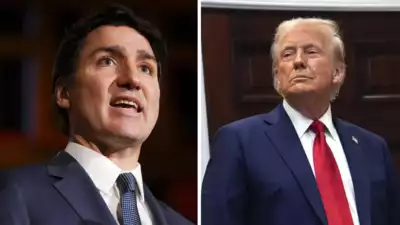Canadian Prime Minister Justin Trudeau on Thursday warned that American consumers will face higher prices if US President Donald Trump proceeds with plans to impose sweeping tariffs on Canadian products.
Trump announced earlier in the day that he intends to apply a 25% tariff on imports from Canada and Mexico, with implementation potentially starting as soon as February 1. He had previously threatened to impose sweeping new tariffs on Mexico, Canada, and China immediately after taking office, but they were not implemented on his first day.
Speaking in Ottawa, outgoing PM Trudeau pointed out that Canada would respond with retaliatory tariffs if Trump moves forward. “Whether it be back on January 20th, on February 1st or February 15th as a Valentine’s Day present, or on April 1st or whenever, Canada will respond,” Trudeau said. “Prices for American consumers on just about everything will go up. We don’t think he wants that.”
The tariffs would target a wide range of products and could disrupt key markets, including autos, lumber, and oil. Alberta Premier Danielle Smith cautioned that Americans in some states could see gas prices increase by more than a dollar per gallon if Canadian oil faces additional tariffs. Despite Trump’s assertion that the US does not need Canada, nearly 25% of America’s daily oil consumption is supplied by its northern neighbour.
Canada is also a critical supplier of 34 essential minerals and metals, as well as the largest foreign source of steel, aluminium, and uranium for the US Trudeau highlighted the importance of bilateral cooperation.
“The US should be working even more with Canada on our energy, on our critical minerals, on the goods they need to deliver the economic growth that Donald Trump has promised,” he said. “That is our first choice. If they do move forward on tariffs, we are ready to respond in a strong way but in a way to figure out how to get them removed as soon as possible.”
Canada is reportedly considering retaliatory tariffs on US products such as orange juice, toilets, and certain steel goods. This would mirror the response in 2018, when Canada imposed billions of dollars in duties after Trump raised tariffs on Canadian steel and aluminum. “Everything is on the table,” Trudeau said. “It would be bad for Canada, but it would also be bad for American consumers.”
The economic relationship between the two countries is significant, with nearly Canadian dollars 3.6 billion ($2.7 billion) in goods and services crossing the border daily. Canada is also the top export destination for 36 US states. However, Trump has remained focused on border issues, linking Canada and Mexico to the flow of fentanyl into the US
“We have highlighted that less than one percent of illegal drugs coming into the United States, less than one percent of migrants going into the United States, come from Canada, but we’re still investing over a billion dollars and strengthening our border,” Trudeau said.
Trump has also frequently mischaracterised the US-Canada trade relationship, claiming a $200 billion trade deficit, which experts have debunked. During a virtual appearance at the World Economic Forum, he suggested a drastic solution. “You can always become a state, and if you’re a state, we don’t have a deficit. We won’t have to tariff you,” he said.




